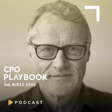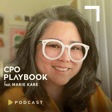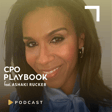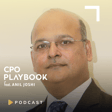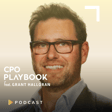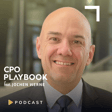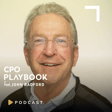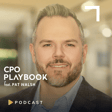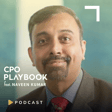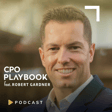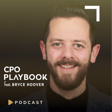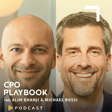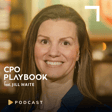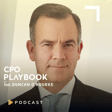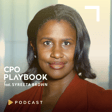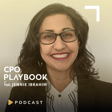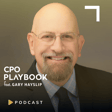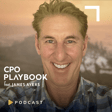Introduction to the CPO Playbook Podcast
00:00:04
Speaker
Hello everyone, I'm Felicia Shakiba, and you're listening to the CPO Playbook Podcast. Join me and my guests as we feature insightful conversations with HR leaders, people scientists, and executives from diverse industries and functions, offering valuable perspectives on the future of work.
00:00:23
Speaker
Discover a unique outlook on navigating the complexities of the modern-day working world, exploring innovative strategies in talent management and corporate culture from the chief people officer's perspective. Tune in to stay ahead of the game when it comes to all things people related.
Challenges of Cultural Transformation
00:00:44
Speaker
According to a study by McKinsey & Company, 70% of all change efforts fail. This is a sobering statistic that highlights the challenges organizations face when attempting to transform their culture.
00:00:58
Speaker
One reason culture transformation is so challenging is that it involves changing people's deeply ingrained beliefs, values, and behaviors. Additionally, cultural transformation requires a significant amount of time and effort, as well as strong leadership and communication. It involves not only changing individual behaviors, but also reshaping the organization structures, processes, and systems.
00:01:25
Speaker
Moreover, cultural transformation often faces resistance from employees who are comfortable with the status quo and may feel threatened by change. This resistance can manifest in many forms, such as apathy, passive aggression, or even outright sabotage. Finally, cultural transformation requires a long-term commitment from leaders and the organization as a whole. Change cannot happen overnight,
00:01:52
Speaker
And it takes sustained effort and focus to ensure that the desired cultural shift is embedded into the organization's DNA.
Meet Anne LeCombe and Her Career Journey
00:02:01
Speaker
Joining us today is Ann LeCombe, an executive fellow at Harvard Business School,
00:02:07
Speaker
Anne brings with her a wealth of experience in the creative industries. Her impressive 30-year progression has taken her from Disneyland Paris to Walt Disney Animation Studios in Los Angeles, where she served as the SVP of Studio Planning and Talent. More recently, she served as the Global Head of Talent and Animation Production at Weta FX in New Zealand. Anne, thank you so much for being here. Welcome.
00:02:43
Speaker
Thank you, Felicia. It's a pleasure. Anne, you've had a varied career path starting in law and eventually moving into talent management and then a functional leader as head of production. What was the trigger that led to a dual role in talent and production?
00:03:04
Speaker
My career sounds sometimes a little unconventional because I changed different functional areas, but I think there was one big true line, which was people. At the time of the transition into production, the role had become available because the previous leader was leaving, and I had built a strong relationship with that previous leader because we were driving change.
00:03:26
Speaker
When change and transformation comes, it's more of a horizontal exercise where you need your fellow leaders aligned with the purpose of where you're going. And you constantly need to align people, process and tools. And so I felt that in my HR role, in my talent role, I could only go so far. And then there was, of course, production and the making of these movies. And it was difficult to influence that area without being in charge of it.
00:03:54
Speaker
And so when the opportunity arose and my leaders asked me whether I might be interested, I had been close enough to it to understand enough. I wasn't an expert. Between those two, I knew enough to actually lead the group and try to continue the transformation without having another partner to bring along for the ride. And I assume those leaders had to have a great trust in you in order to offer you that position.
Building Trust and Collaboration
00:04:19
Speaker
Yeah, for sure. I think that at the time I had already done a part of the transformation in my role in HR and I think we were fundamentally aligned on purpose and values and where we actually wanted to go. And that they could see that with the work that I had done so far, I had made strides already and could just be exponentially more impactful if my purview was larger.
00:04:44
Speaker
And how were you able to build trust after being placed in a role like that of production when you had never produced a film before?
00:04:52
Speaker
First of all, I started by listening and being really curious because I had a lot to learn. And so I went around and asked people what they were doing, why they were doing it, the way they were doing it, what was difficult about it, how it could be improved. So I listened a lot. And I think that gave people pride of explaining to me what they were doing. Because if I asked questions,
00:05:15
Speaker
I asked questions without judgment. If I would ask, why are you doing it that way? It was an honest question because I didn't know, not because I was questioning why they were doing it that way. It was not a loaded question. And so I think that openness really allowed people to
00:05:32
Speaker
kind of built trust and because I was in a role where I wasn't the expert I had to trust people around me. I had no other choice and I think that trust pays back in return when you do that but people know that you have their back if something goes wrong or when they speak up and say something that might be uncomfortable. If you as a leader are there to help them through
00:05:55
Speaker
those moments, they will trust you in return for what you have given to them. I think that was the start of the journey of just building those relationships, listening to what people had to say, really staying with the problem and trying to make the environment better
Handling Resistance in Change Management
00:06:10
Speaker
for them. And then when people started seeing improvements, it gained more and more trust that we were on the right path, we were going the right direction and gave some momentum to the exercise.
00:06:23
Speaker
And change often comes with those who might be challenging the things that you're working on. How did you meet people who were less adaptive to the change or improvements you were looking forward to? Yeah, I think in every change effort, there are the people that are interested in following something new and different. And there are the people that are loud and they don't like it. Most of the time that comes from insecurity. And then there's the people in the middle that are
00:06:52
Speaker
looking over the fence, thinking it might be interesting but definitely not taking a position yet until they see some momentum in the journey. Initially on my transformational journey I paid a lot of attention to the people that were very negative because they were loud.
00:07:07
Speaker
And perhaps probably a little too much. I think it's really important to have conversations and try to understand what it is that is standing in their way. What are the competing commitments that make them so resistant to this change? What's the problem that is standing in the middle of the change and why can't they come on board with the journey?
00:07:27
Speaker
I think that by listening and not listening just to what they say that they don't like, but listening deeper to what actually the problem is that is standing there and then finding solutions for them, they can come along for the journey. And so I had to
00:07:42
Speaker
continue creating processes and make sure that I kept everybody in the boat and that everybody was aligned. But for the people that were loud and resistant, ultimately when the movement was taking roots and it was going in a good direction, some would change their mind and come on the journey. Others were still too resistant and probably couldn't get on board with the journey and they might have had to leave.
00:08:06
Speaker
Those voices are fairly loud. Is it fair to say that you needed support from your manager or other leaders to help you move in a specific direction, even when those voices may cause friction?
00:08:21
Speaker
For sure, there's a lot of people to bring along for the journey. A lot of stakeholders you need to pay attention to. Of course, your bosses and the people that are leading you, your peers and the people that stand next to you and the people that report into you and the people you're leading. So there's a lot of people you constantly need to stay aligned with in order to make progress despite the resistance, despite the obstacles, despite the fact that sometimes it doesn't go quite the way you would have hoped it would go.
00:08:50
Speaker
So being very clear on your purpose and your values and staying grounded in those and being able to communicate them over and over and over again so people understand that it won't always be a perfect journey because you have to take risks and that sometimes comes with a little bit of failure.
00:09:08
Speaker
But even in those moments, being very clear as to why you took those risks and what the result was, and staying very calm and grounded in your ideas and principles, I think helps a lot. For the leaders, it was about communicating where I was going, where I was hoping to go, and where some of the resistance might come from. If I was anticipating it, anticipation, I would bring them along for the journey there too, saying, this is probably not going to go well, this is what the noise is, and this is how I...
00:09:37
Speaker
want to respond to that, but being as proactive as possible to make sure everybody was staying together. What were some of the other challenges you faced early on in your cultural change initiative and how did you overcome them?
Remote Work and Organizational Transformation
00:09:52
Speaker
My biggest challenge was probably that I was extremely impatient because I wanted to go faster than what the pace of the transformation actually allowed for. And I had to learn how to slow myself down and make sure that I always connected with people that were going through their transformation and make sure that I was not too far ahead of them, but that I could listen to their concerns and bring them along on the journey. So it required for me to learn how to listen differently
00:10:21
Speaker
and to really connect with where the people were in order to bring them somewhere else because you can change what you don't understand and so I had to understand where people actually were under cultural transformation and what they were fearing, what they were perceiving, what they were concerned about, what kept them up at night
00:10:41
Speaker
And if I really had a deep understanding of that, I could talk to those issues and bring them along for the journey. In the beginning I think I was too fast and I just wanted to move forward as far because I felt a sense of urgency. But that isn't always how change happens. Change takes time and you need to allow for that time to happen.
00:11:05
Speaker
One thing that was interesting when I worked for WEDAI in New Zealand, a lot of my work was done remotely, and it was also about cultural change, but it was difficult in a remote environment to feel the pace of the organization. So I never knew whether I was going too fast or whether I was going too slow, because I wasn't physically there with them, it was all virtual, it was all remote.
00:11:27
Speaker
And I think feeling the organization and knowing where you are so you can take your next step is really important. And I had to learn how to do that virtually.
00:11:36
Speaker
Could you describe what the action items were that you took to listen more? Is that in the form of one-on-ones? Are they focus groups? We did a lot of different things. I think finding a way for people to speak honestly and to make it okay for them to share what they really think is not an easy task. And for different people, it takes on different forms. So we had a program called Spark, which was
00:12:04
Speaker
a program where people could volunteer ideas and then present them and then create a prototype for them, which was one way for us to gather new ideas and innovative thinking. Another way that I personally handled that was by meeting three people a week that I didn't know in the organization. I would send them a note saying, I would love to meet with you, but I would set time apart in my agenda to meet those people and just talk.
00:12:31
Speaker
ask why they were there, what they liked about it, what they didn't like about it, and so have an honest conversation. Ultimately that created a movement in the organization where more and more people wanted to be on that list of people that could come and talk to me. But it was more than just saying my door is open, it was really going to look for people so that they would talk to us. And we did all kind of
00:12:55
Speaker
initiatives, we did executive talks, tea times where people could all come together and just talk to leadership. And that became a habit in the organization. And as a result, I think more and more people felt free to speak up. I'm curious to know how you collaborated with other leaders, potentially even those above you, to implement the production change.
00:13:17
Speaker
I think originally it was all about building a relationship of trust and so spending one-on-one time with every single one of those leaders, understanding what their business was about. That is where I think HR was in such a fantastic position because we know a lot about the business already by just being in the role.
00:13:36
Speaker
it's a role that is trans functional and so you can wonder a little bit in other people's areas and learn so strengthening those relationships was key for me it was very important at one point in my career to understand that as a leader i needed to change my focus i taught my team a word people that were reporting into me but
00:13:56
Speaker
As we were going through the transformation, I realized that my team A were my peers and the people that were sitting next to me at the leadership table. And my team B were the people that were working for me who was equally needed to spend time and focus on them, but I trusted them. What came out of those conversations?
00:14:13
Speaker
The purpose of those conversations was fundamentally to understand what they were worried about, what problems they were trying to solve, and what their priorities were, so that I then could figure out how the transformative effort actually served them better. Because when you're going through change,
00:14:32
Speaker
The ultimate question people ask is, what's in it for me? And so if I could figure out where they were and what they were trying to solve for the organization and align it with where we were actually going, we could do this together. And so that was fundamentally the first attempt in that effort.
00:14:49
Speaker
We then indeed aligned, I think, very, very deeply on values and purpose and direction. And so that accelerated in the organization because everything started singing together. Is it fair to say that the loud voices of the change resistors would surface to your manager, essentially the CEO? And would that mean that the trust between you and your manager is critical to your success?
00:15:17
Speaker
That's absolutely a true statement. There's always a danger that these voices will be heard by leaders. I was hoping that throughout the whole journey I knew that I had the trust of my leaders and they knew that we were going through transformation and I stayed always very calm and I always communicated where we were going, what the values were and what the direction was. Maintaining that trust is key.
00:15:40
Speaker
because there will be moments where the loud voices will be trying to get attention from somebody higher up to stop the movement. My efforts to drive the transformative effort, I would always try to be one step ahead and have those conversations with them directly so they didn't feel the need to go to my leaders.
00:15:59
Speaker
Let's talk about psychological safety for a moment. For those leaders who haven't gone through a transformation, the movement sometimes requires us to start at the top. The first thing I might ask is, do we have psychological safety among the executive team for transformation to even begin? How do you approach that scenario? That's a big, big question.
00:16:25
Speaker
Well, I do think that it's the job of the leader to create an environment. And when that environment sends signals about care and trust, people will start feeling that somebody else cares for you, but really deeply cares for you.
00:16:41
Speaker
and about why you're there, about what you bring to the organization. So that takes time to send that kind of messages. But it's also, it's every single decision needs to send that message of care. When that happens and when people understand that they can trust you because you trust them, it's always a two-way street. When you start caring for people, they start caring for you. And when they care enough, they will talk. The effort of speaking up in order to make something better is worth taking.
00:17:10
Speaker
What guidance would you offer to an HR or functional leader who is required to collaborate with a CEO that has yet to grasp the principles of fostering psychological safety within their company?
Leadership's Role in Shaping Culture
00:17:25
Speaker
Well, it's difficult to
00:17:27
Speaker
find your space in that environment. But what I would say is that it is important that we speak truth to power. I think that's part of our roles and especially in HR. I think we have a responsibility. And one thing that I refer to very often is the shadow of a leader. I will ask
00:17:48
Speaker
my leaders' questions about whether they're aware of the shadow they cast in the organization. When they're not in the room, what do people actually say? How do they feel about them? And have them think about that. And most of the time that is a very informative journey where they themselves come to a certain realization that perhaps what they're projecting into the organization is not necessarily how they want the organization to behave.
00:18:12
Speaker
But very often an organization takes on the personality of its leader, so it's very impactful for he or she to act or behave in a certain way. I always start with self-reflection from the leader when I find the right opportunity in order to start that process, because I think
00:18:31
Speaker
By them then seeing and getting that feedback you can get into a trusting relationship partnership where you can together coach and help and point out the false notes in some of their behavior that might send the wrong signals into the organization and find that level of trust even at that level.
Insights on Digital and Cultural Transformation
00:18:50
Speaker
Is there anything in particular that you teach at Harvard that would be valuable to what we're learning about today?
00:18:56
Speaker
Through my work with Harvard, we have done a lot of research on digital transformation in particular. So the impact and the influence of technology and how it influences how businesses operate. And in the last couple of years, we've done surveys with executives around the world, as well as a written survey that was answered by more than 4,000 executives. So we have a lot of information. And what we particularly were looking for in our second edition
00:19:22
Speaker
was the companies that successfully do digital transformation, what do they do differently? What is different in their effort that makes them stand out? Because many of these efforts don't succeed. It was interesting that the people part and the ones that focused on cultural transformation and the employee experience
00:19:41
Speaker
were more successful than the ones that didn't. And that's a difficult because a lot of people invest in the technology, the tools, the infrastructure, but those things don't make the difference on the digital transformation process. When I was younger in my career, I remembered having a mentor and at one point I said to the mentor, I think I'm spending too much time on the people. His response was, well, you can never spend enough time on the people.
00:20:07
Speaker
And so the work that I'm doing right now at Harvard is a confirmation of that. And that it's really important to spend the time to bring people along, to train them, to upskill them if needed, but to communicate with them and make sure that we're empathetic enough to understand what their concerns are so they can follow us on the journey. What advice would you give to leaders who are currently working through a cultural transformation?
00:20:35
Speaker
It's not an easy journey. You have to be very resistant. You have to allow the time for change to happen. And my words of advice would be be competent and confident and be consistent. Because cultural change happens when everything starts coming together in a logical way.
00:20:55
Speaker
That could be the work you're doing, the processes you're having, but also the policies you have as an organization, how your building is laid out, what your habits are as you come together. And when that consistently starts sending signals that change is going in the right direction and that people can speak freely and shouldn't be worried and there's psychological safety, I think that's where change happens. Is there anything that you want to talk about we haven't touched on yet?
00:21:24
Speaker
Yeah, I wanted to talk a little bit about the importance of understanding the problem. Staying with the problem long enough before starting to go to solutions. And especially in cultural change, people will start throwing out ideas and start doing things.
00:21:39
Speaker
but sometimes without having spent sufficient time analyzing the problem. What's at the core of this? And it's a little bit like peeling an onion where you see certain behaviors and you're wondering why they are behaving that way, but it's actually something deeper underneath. And we start fixing the symptoms rather than really understanding the problem. As a leader in an organization, I always keep saying to my teams, fall in love with the problem. Don't go to the solution too quickly.
00:22:07
Speaker
Stay there and make sure you have the right problem because if you fix that one things will unfold a little bit like a flower but if you're fixing the wrong one it'll just be a leaf and it fall off. I think that's really important as we listen to not listen necessarily to the ideas that people are suggesting to us because then you will sit with a hundred ideas and you can't implement all of them but really look at all these ideas and see what do they have in common? What problem are they trying to solve? And when you can find that
00:22:37
Speaker
I think you can find richer solutions and more impactful movements in your cultural transformation process.
Conclusion and Call to Action
00:22:44
Speaker
Anne, this has been wonderful. Thank you so much. Thank you so much, Felicia. Thank you for the invitation. It's a pleasure to be here. That's Anne Lacombe, executive fellow at Harvard Business School and former 30-year veteran of Walt Disney Animation Studios.
00:23:08
Speaker
If you like today's podcast, we have more podcasts on innovative HR strategies, talent management, organizational culture, and more, and how to navigate the complexities of modern day HR. Find them at CPOplaybook.com slash podcasts or search CPO Playbook on Apple podcasts, Spotify, or wherever you listen. Thanks for listening to the CPO Playbook podcast. We'll be back with a new episode next time.
00:23:39
Speaker
I'm Felicia Shakiba.
00:23:43
Speaker
If you love CPO Playbook, the best thing you can do to support us is become a subscriber. You can do that at CPOplaybook.com slash podcast. That's CPOplaybook.com slash podcast. If there's an episode you loved, please share it with a friend. And if you have an idea you would like us to talk about or a guest you'd like to nominate, visit CPOplaybook.com slash contact us to suggest an idea.

